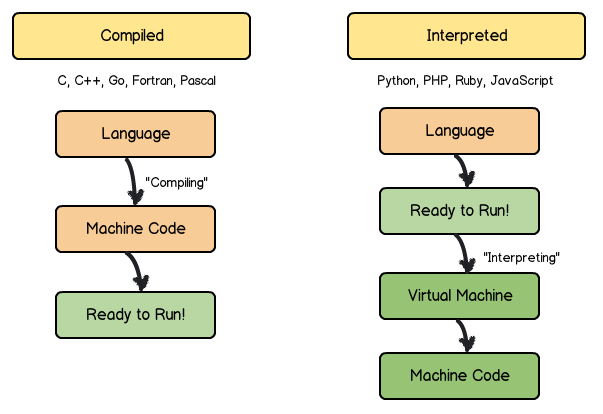Overview:
Interpreted and compiled languages are two different approaches to executing PC bundles, each with particular attributes and gifts.
Interpreted languages, alongside Python, JavaScript, and Ruby, are finished line-through-line through a mediator at runtime. The source code of a deciphered language is quickly converted into contraption code or bytecode, which is then achieved on the double. This implies that each time this framework is directed, the mediator deciphers and executes the code, without creating a different executable report. Deciphered dialects give adaptability and simplicity of advancement in light of the fact that changes to the code might be tried and done rapid with out the need for accumulation.
 |<img data-img-src='https://miro.medium.com/v2/resize:fit:603/1*oUPhgu1G22fxhl8L6g3YCg.png' alt='What are the differences between interpreted and compiled languages' /><p>On the other hand, <a href=">compiled languages, such as C, C++, and Java, are converted into gadget code or bytecode sooner than execution, producing an independent executable record or bytecode report. The gathering procedure incorporates interpreting the entire source code into framework-coherent guidelines through a compiler. This ordered code can then be played out two or multiple times with compelling reasons why it should be recompiled, bringing about quicker execution contrasted with deciphered dialects. Accumulated dialects are routinely preferred for execution of fundamental bundles and frameworks programming in which speed and productivity are principal.
|<img data-img-src='https://miro.medium.com/v2/resize:fit:603/1*oUPhgu1G22fxhl8L6g3YCg.png' alt='What are the differences between interpreted and compiled languages' /><p>On the other hand, <a href=">compiled languages, such as C, C++, and Java, are converted into gadget code or bytecode sooner than execution, producing an independent executable record or bytecode report. The gathering procedure incorporates interpreting the entire source code into framework-coherent guidelines through a compiler. This ordered code can then be played out two or multiple times with compelling reasons why it should be recompiled, bringing about quicker execution contrasted with deciphered dialects. Accumulated dialects are routinely preferred for execution of fundamental bundles and frameworks programming in which speed and productivity are principal.
One critical differentiation among interpreted and compiled languages lies in their convenience and stage freedom. Interpreted languages tend to be more movable on the grounds that the translator abstracts away the hidden equipment and running framework, permitting the indistinguishable code to run on special designs without adjustment. Compiled languages, on the other hand, frequently require stage specific compilers and bring stage interesting executable documents, which could likewise restrict their transportability.
In rundown, interpreted languages give adaptability and simplicity of progress, while compiled languages offer better by and large execution and effectiveness. The inclination among deciphered and assembled dialects depends on the specific necessities of the undertaking, alongside by and large execution concerns, improvement speed, and stage similarity.
Read more: How do I handle memory management in languages like C and C++